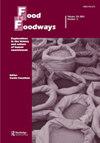“人把食物送到嘴里,动物把食物送到嘴里”——20世纪70年代日本学校午餐叉的道德政治
IF 1.1
Q2 ANTHROPOLOGY
引用次数: 0
摘要
摘要我们不仅是吃什么,而且是怎么吃的。这篇文章探讨了20世纪70年代伴随着学校午餐中大米的推出而出现的斯波克用法的道德政治。我认为,这些关于物质文化和饮食礼仪的论述反映了20世纪70年代日本的经济和政治背景,以及(重新)出现的关于民族认同以及儿童饮食和餐桌礼仪在决定日本未来中的作用的紧张关系。日本的国家学校午餐计划是“创造日本”的关键所在。学生和老师通常在教室里吃同样的饭,互相服务和打扫卫生。1946年被占领军复兴,到20世纪60年代,该项目几乎在公立小学和中学普及。食物主要是面包、牛奶、汤、炖菜等。斯波克是标准器具。它便宜、多用途、卫生,是一种合理的大众餐饮解决方案。20世纪70年代中期,在菜单上引入大米的同时,斯波克成为了一部关于儿童饮食习惯和国家命运的道德剧中的反派。文化主义专家警告说,斯波克斯阻碍了日本在世界各国中的特殊灵活性、聪明性和敏感性的发展。本文章由计算机程序翻译,如有差异,请以英文原文为准。
“Humans bring food to their mouths, animals bring their mouths to food”—The morality politics of school-lunch sporks in 1970s Japan
Abstract We are not only what we eat, but how. This article examines the 1970s’ morality politics of spork usage that accompanied the rollout of rice in school lunches. I argue that these discourses about the material culture and etiquette of eating reflect the economic and political context of 1970s Japan and (re)emergent tensions about national identity and the role of children’s diet and table manners in determining Japan’s future. Japan’s national school lunch program is a critical site of “making Japan.” Schoolchildren and teachers generally eat identical meals in their classrooms, serving and cleaning up after each other. Revived in 1946 by the Occupation, the program was nearly universal in public elementary and middle schools by the 1960s. Meals were mostly bread, milk, and soup, stew, etc. The spork was the standard utensil. Cheap, multipurpose, and hygienic, it was a rational mass-catering solution. In the mid-1970s, simultaneous to the introduction of rice to the menu, the spork became the villain in a morality play about children’s eating habits and the nation’s fate. Culturalist pundits warned that sporks hindered development of the special dexterity, cleverness, and sensitivity that made Japan superior among the nations of the world.
求助全文
通过发布文献求助,成功后即可免费获取论文全文。
去求助
来源期刊

Food and Foodways
ANTHROPOLOGY-
CiteScore
2.20
自引率
0.00%
发文量
16
期刊介绍:
Food and Foodways is a refereed, interdisciplinary, and international journal devoted to publishing original scholarly articles on the history and culture of human nourishment. By reflecting on the role food plays in human relations, this unique journal explores the powerful but often subtle ways in which food has shaped, and shapes, our lives socially, economically, politically, mentally, nutritionally, and morally. Because food is a pervasive social phenomenon, it cannot be approached by any one discipline. We encourage articles that engage dialogue, debate, and exchange across disciplines.
 求助内容:
求助内容: 应助结果提醒方式:
应助结果提醒方式:


